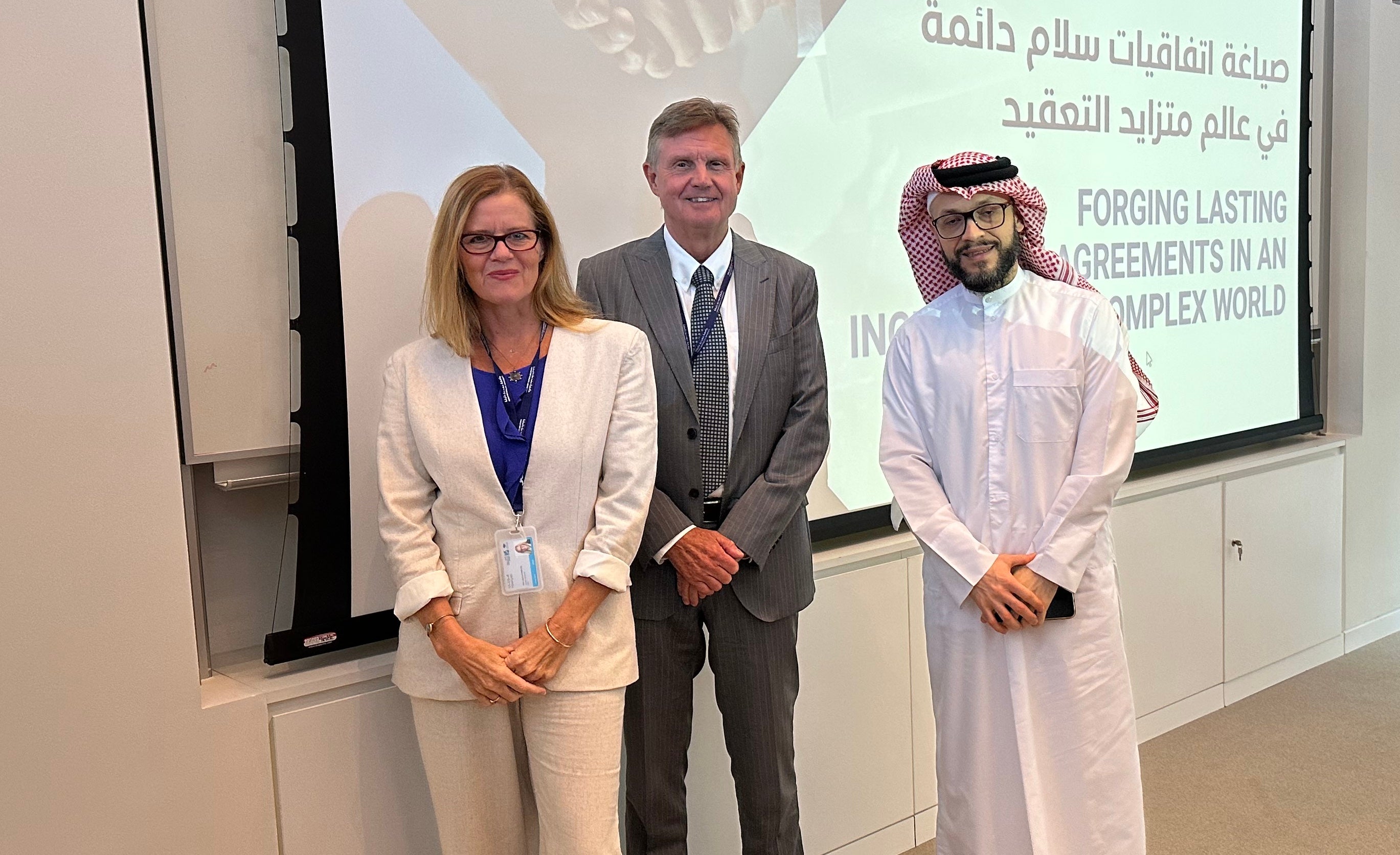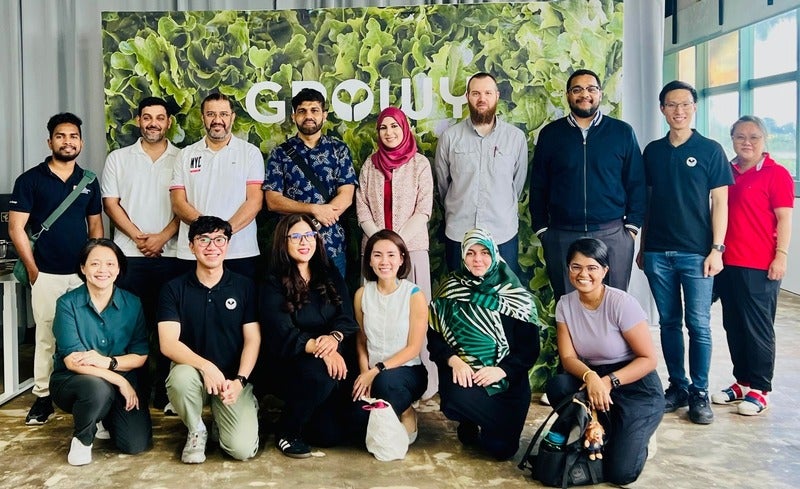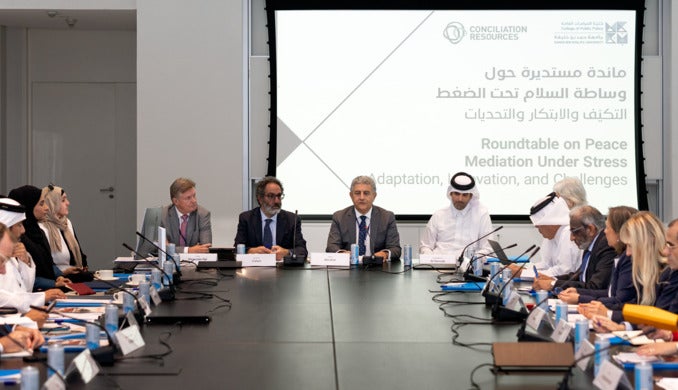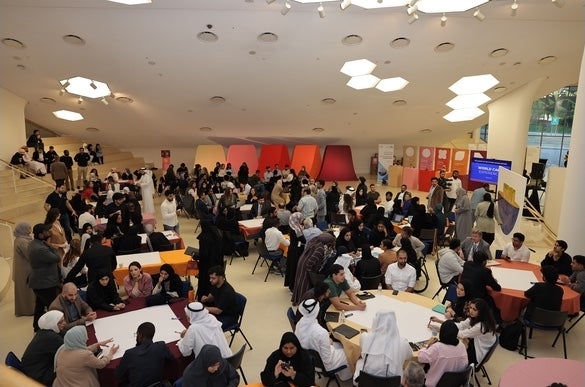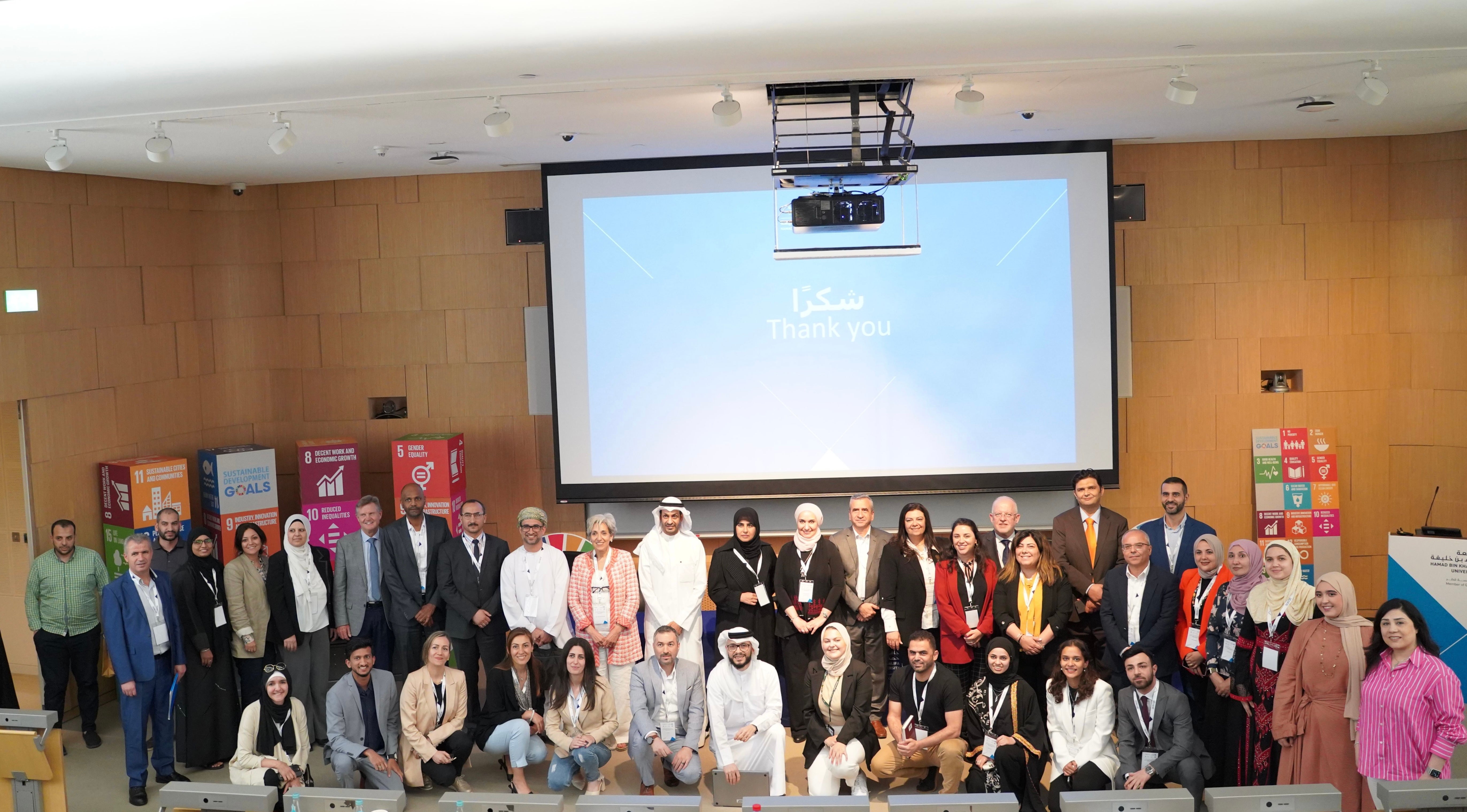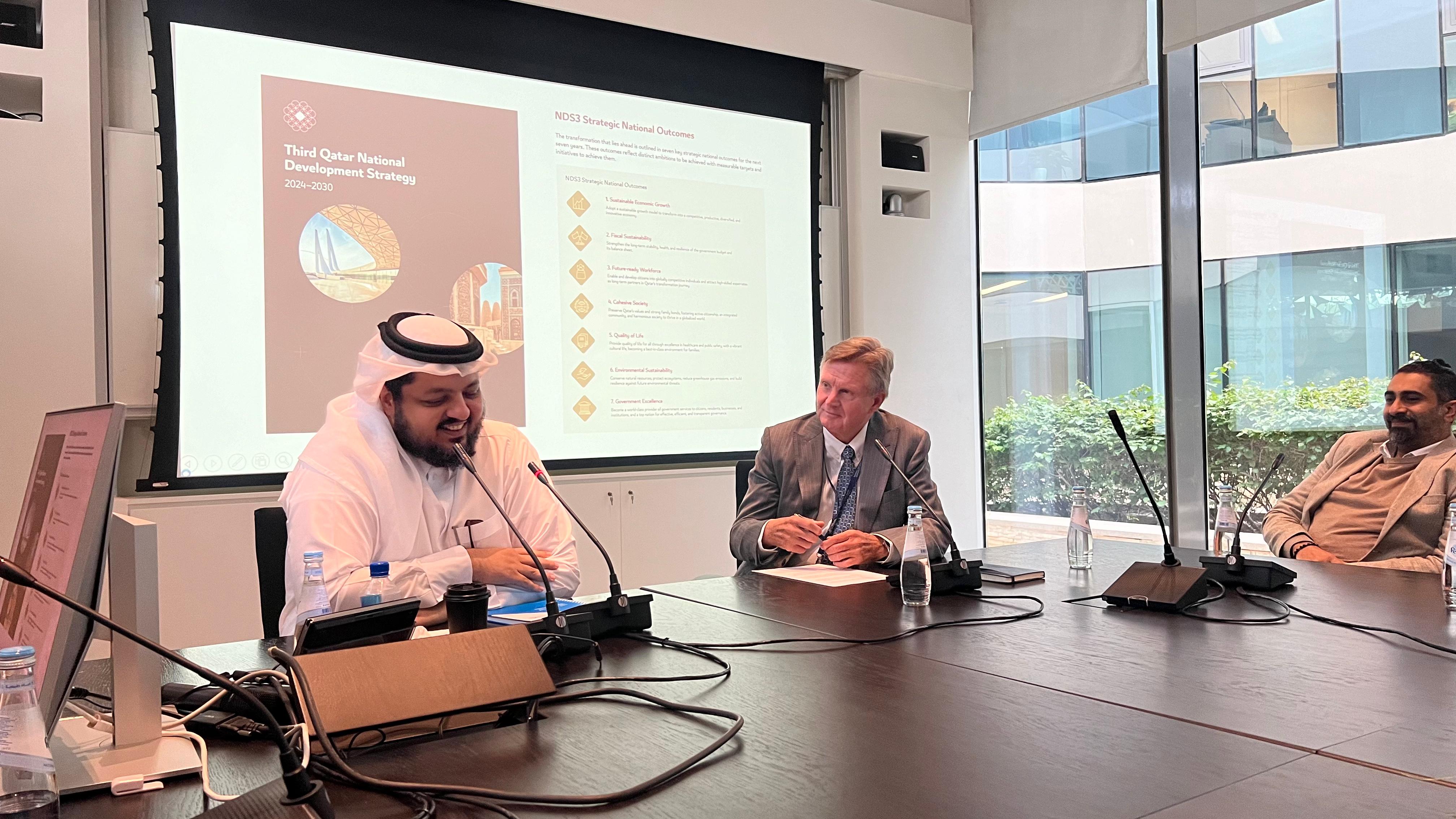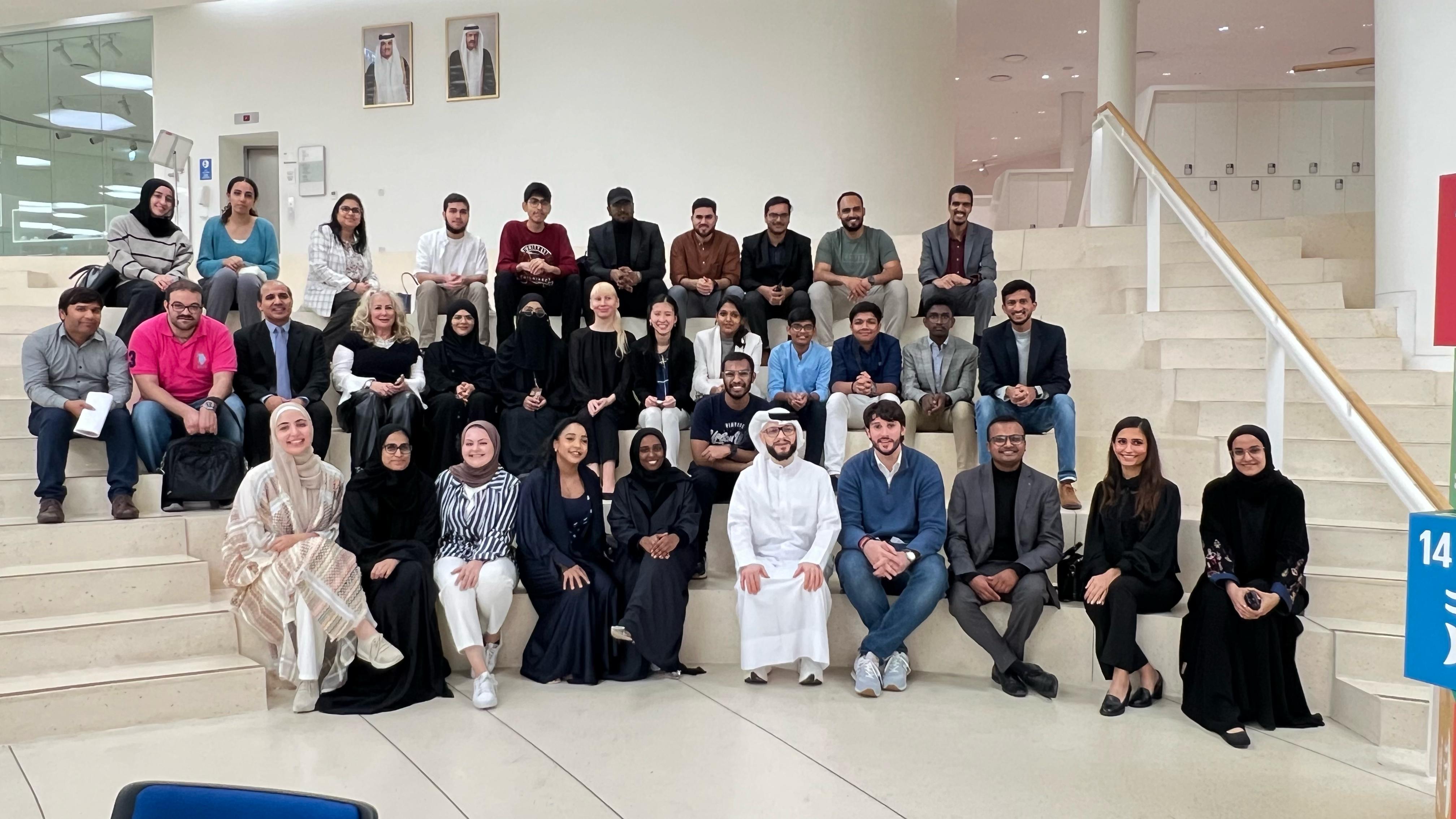
CPP Workshop Highlights AI and Co-Design Principles in Policymaking
Over 50 Qatar-based professionals receive theoretical and practical training on how to incorporate both tools in policy design processes
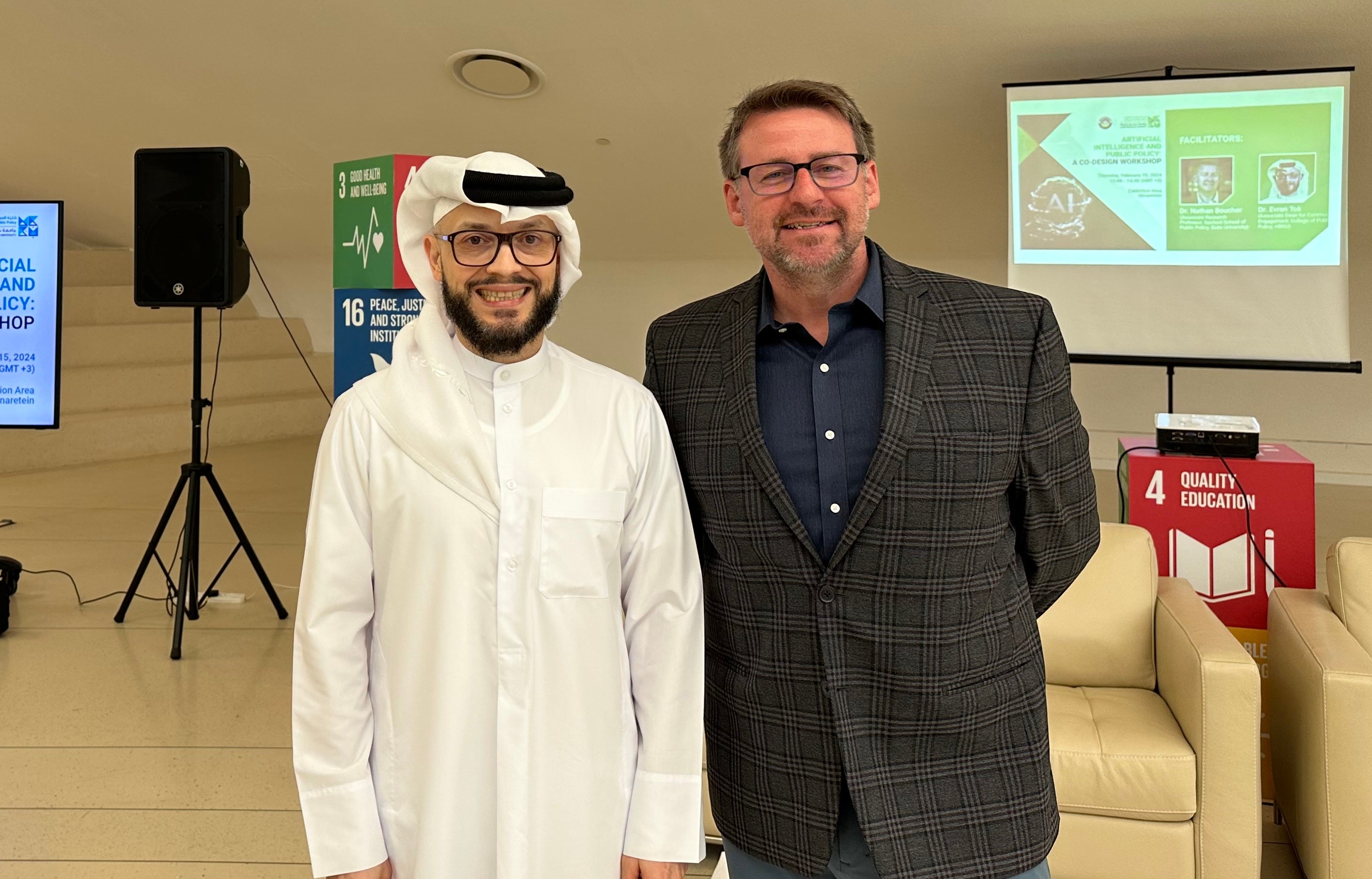
Hadaba: Elevating Innovation and Policy Design, an initiative under Hamad Bin Khalifa University’s (HBKU) College of Public Policy (CPP), hosted a workshop for more than 50 Qatar-based professionals on how to incorporate artificial intelligence (AI) and a co-design approach to policymaking processes.
Dr. Evren Tok, Associate Dean for Community Engagement, CPP, and Dr. Nathan Boucher, Associate Research Professor, Sanford School of Public Policy, Duke University, led the workshop, which imbued participants with a theoretical and practical understanding of both of these tools. The participants represented a diverse array of sectors in Qatar, all of whom sought to deepen their policymaking expertise and benefit their companies and careers.
Dr. Tok gave a lecture on the principles of the co-design approach, which emphasizes the utilization of both a collaborative mindset and industrial design principles to foster innovation in the policymaking process. Dr. Boucher’s presentation then highlighted promising applications of AI throughout the field of public policy and how these technologies could help practitioners.
The workshop ended with a group activity session, which challenged participants to draw from their newly acquired knowledge to provide insightful analyses of several case studies from across the international public policy sector.
Commenting on the workshop, Dr. Tok said: “Technological and societal developments continue to offer new tools for public policy practitioners around the world, giving them opportunities to address prominent challenges more effectively than ever before. Our workshop offered Qatar-based professionals the opportunity to learn some of these tools in an interdisciplinarity setting, reflecting CPP’s approach to fostering innovation in policy making and design.”
Hadaba: Elevating Innovation and Policy Design is a groundbreaking CPP initiative that fosters a dynamic community of practice which embraces innovation, experiential learning, and contextually relevant activities. It serves as a catalyst, enhancing connectivity between experts in the field of public policy and offering customizable tools and resources to the wider community.
CPP aims to become one of the leading public policy schools in the region and the world and a center for teaching and researching responses to policy questions of local and global relevance. The College actively leverages local and transnational synergies and collaborations with distinguished international partners to facilitate expertise and build capacity in Qatar and beyond.
Related News
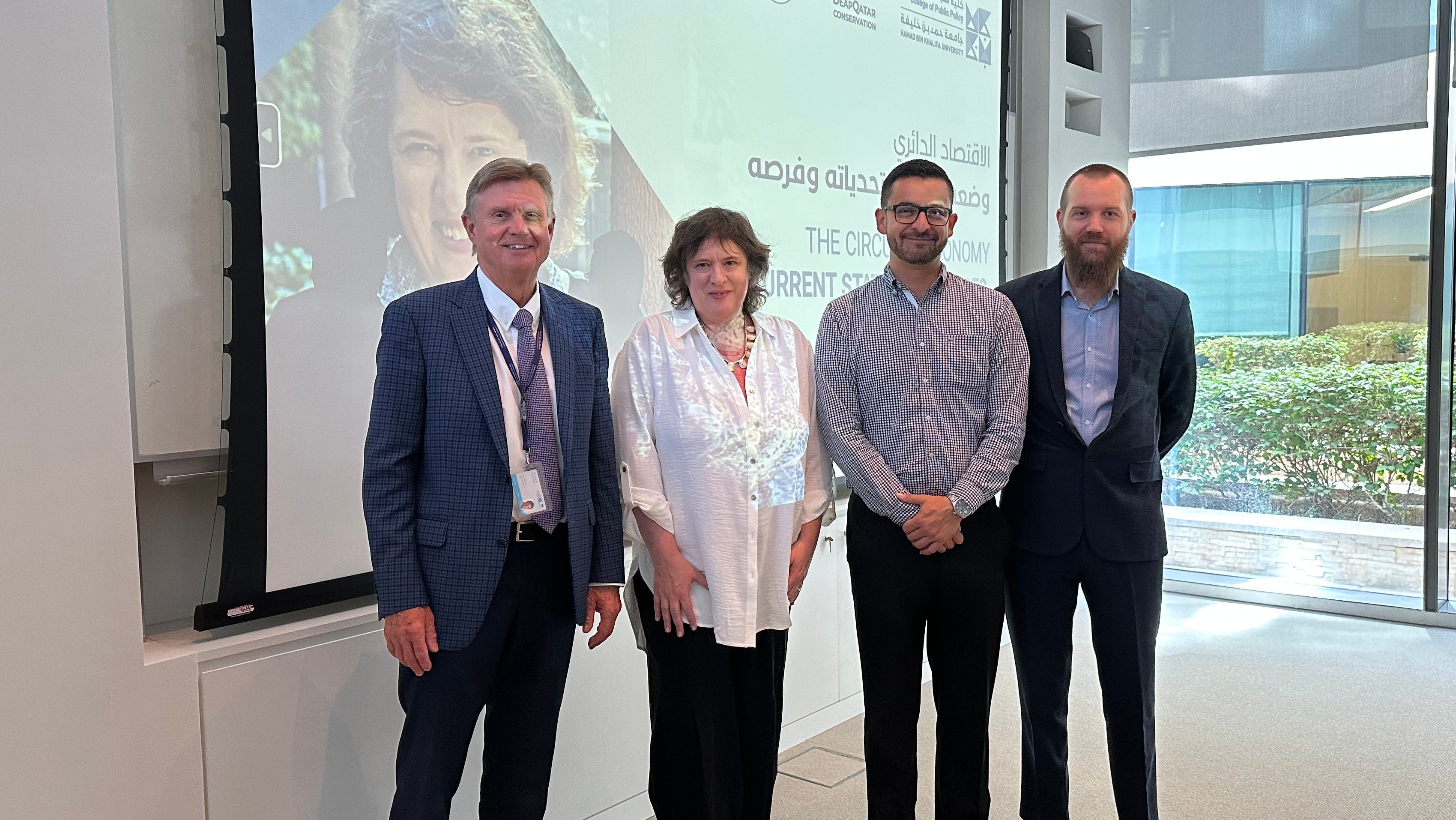
CPP, US Embassy in Doha, and DeapQatar Conservation Co-Host Circular Economy Lecture
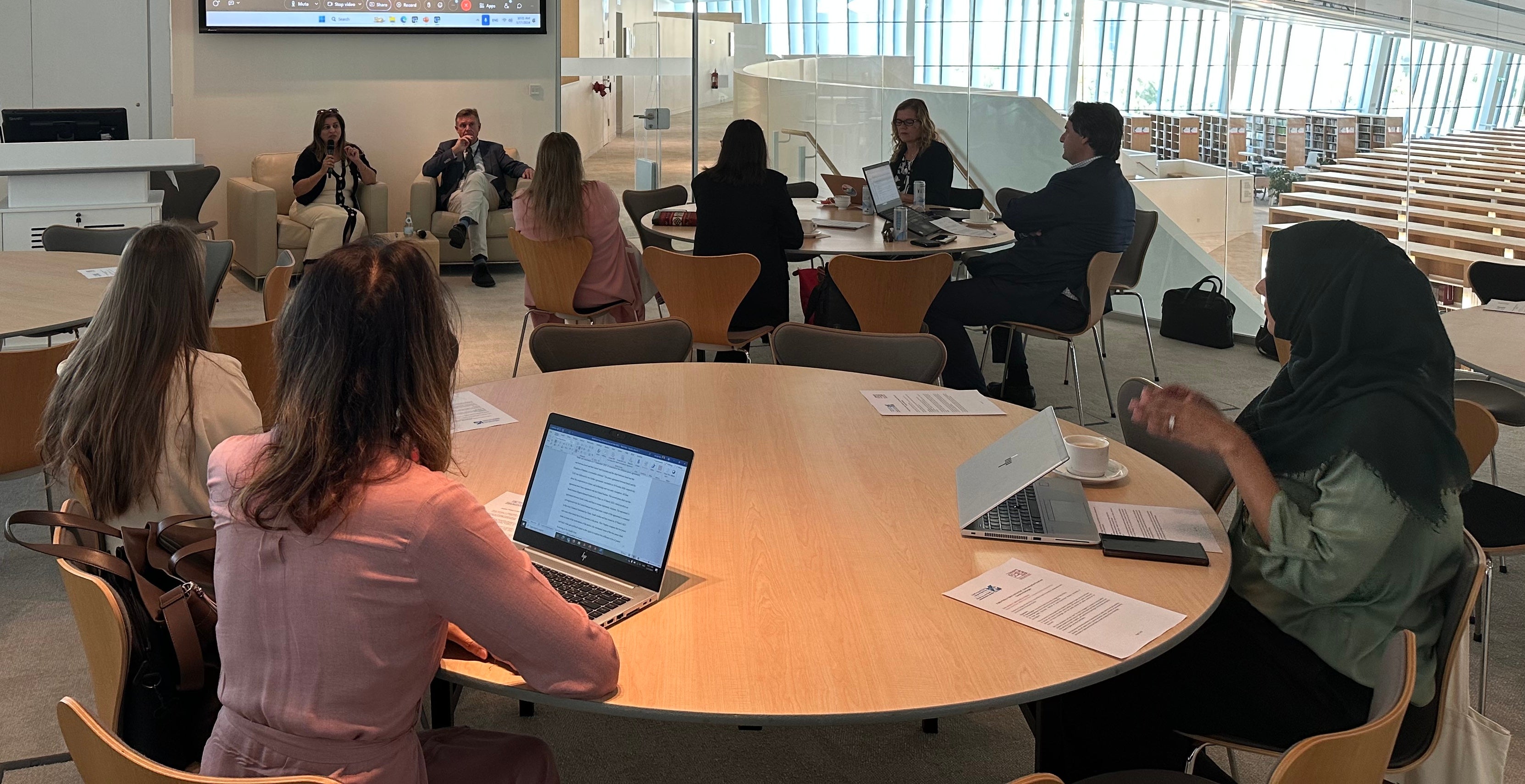
CPP, Doha Institute for Graduate Studies, and University of Birmingham Co-Host Symposium on Public Policy in the Gulf

HBKU’s College of Public Policy Invites Global Academics and Experts for Conference on Rebuilding Higher Education in Gaza
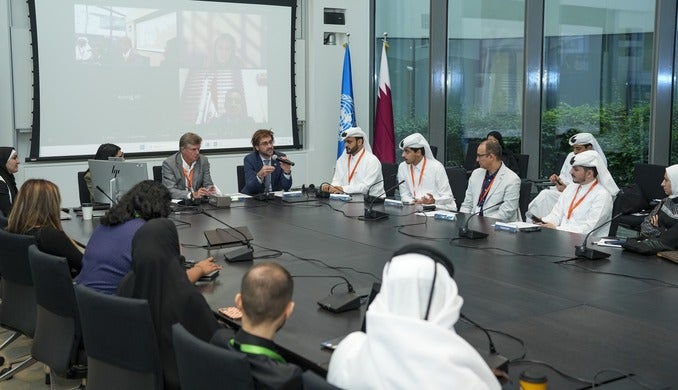
The United Nations Office of Counter-Terrorism and Leading Universities in Qatar Launch the Doha Youth Parliamentary Forum
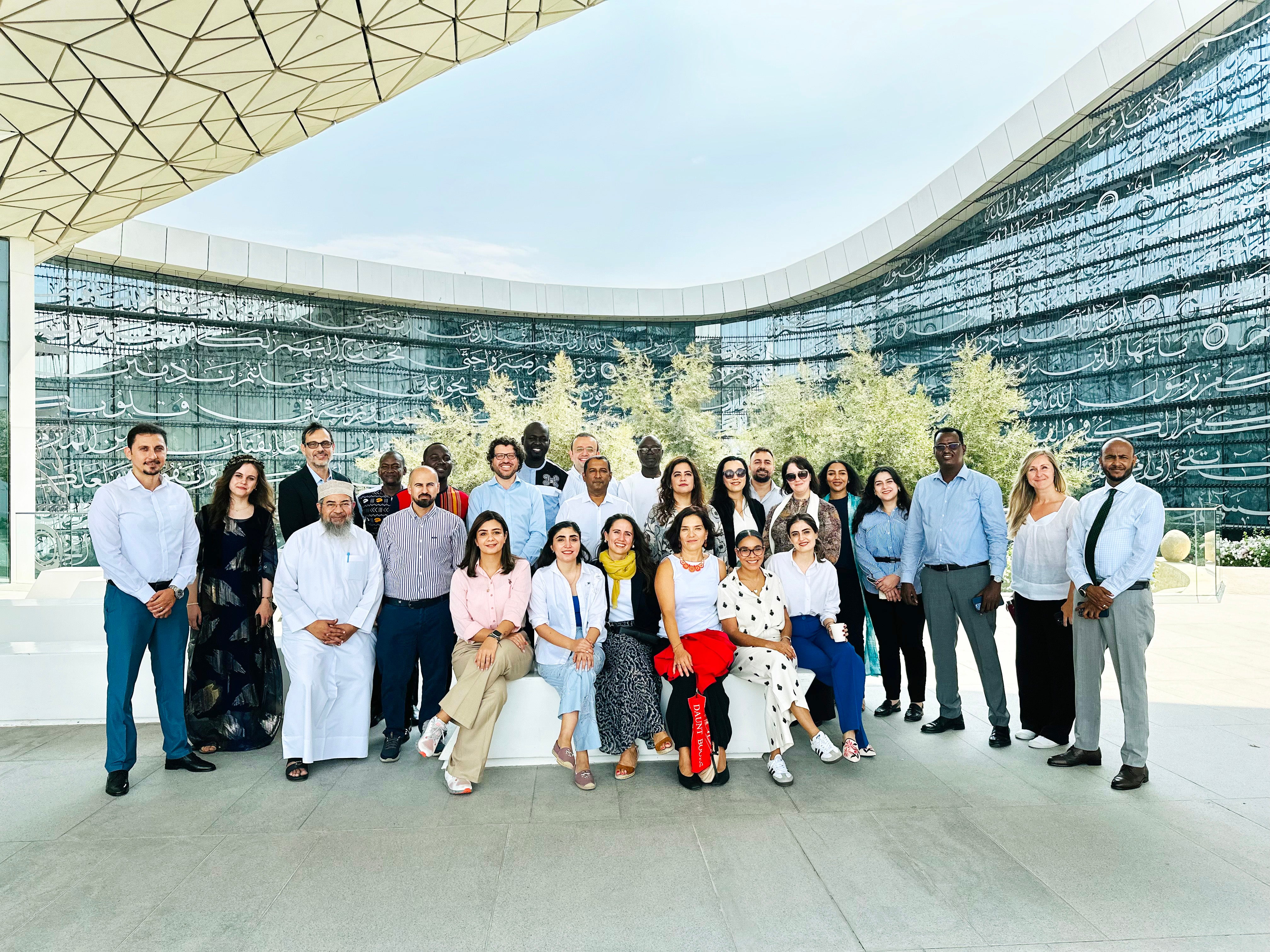
HBKU’s CPP and Geneva Graduate Institute Launch 2024-2025 Executive Programs in Development Policies and Practices
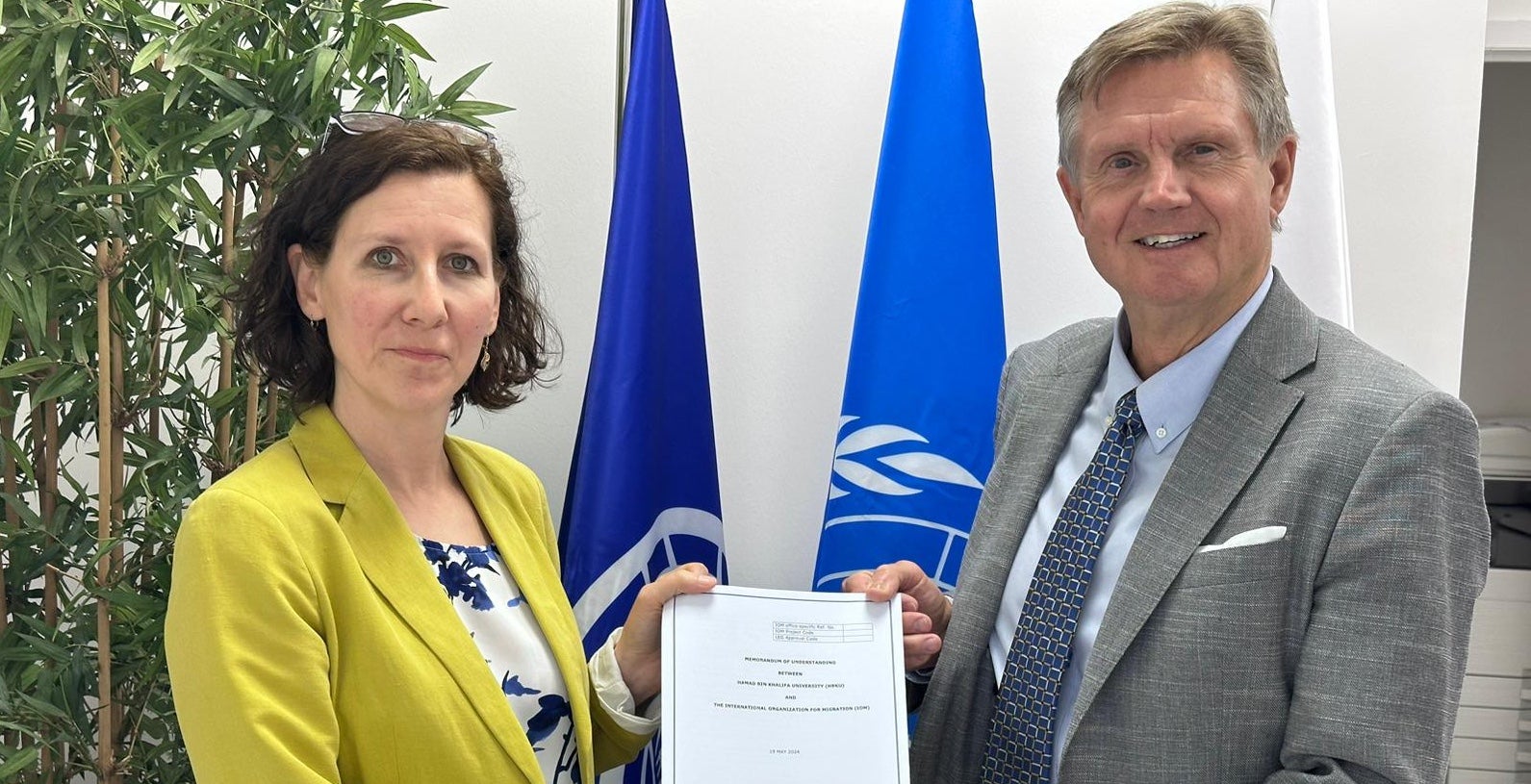
HBKU’s CPP Celebrates #TogetherinQatar Awards Ceremony after Signing MoU with the International Organization for Migration
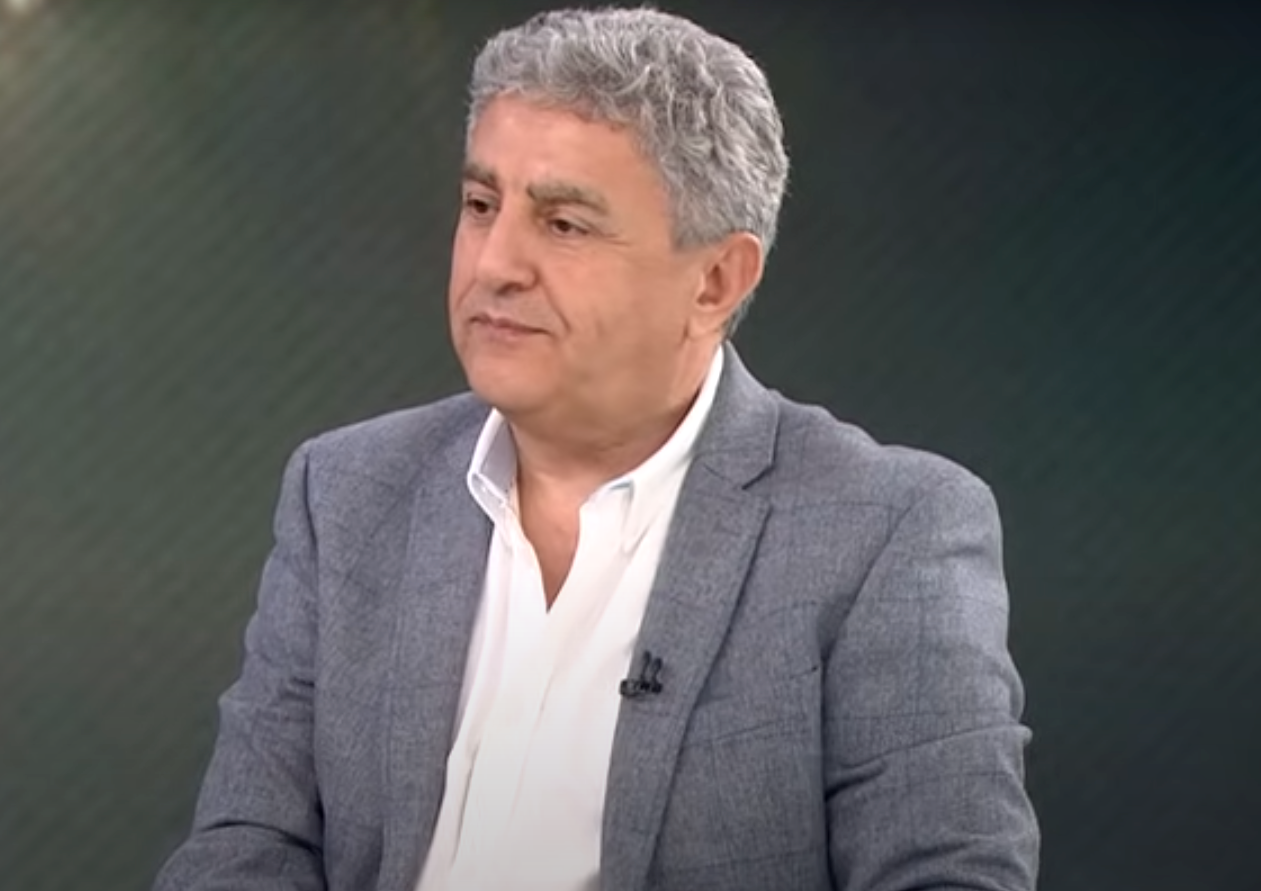
HBKU Professor Advises Global Policymakers on the Challenge of Engagement with the Taliban’s De-Facto Government
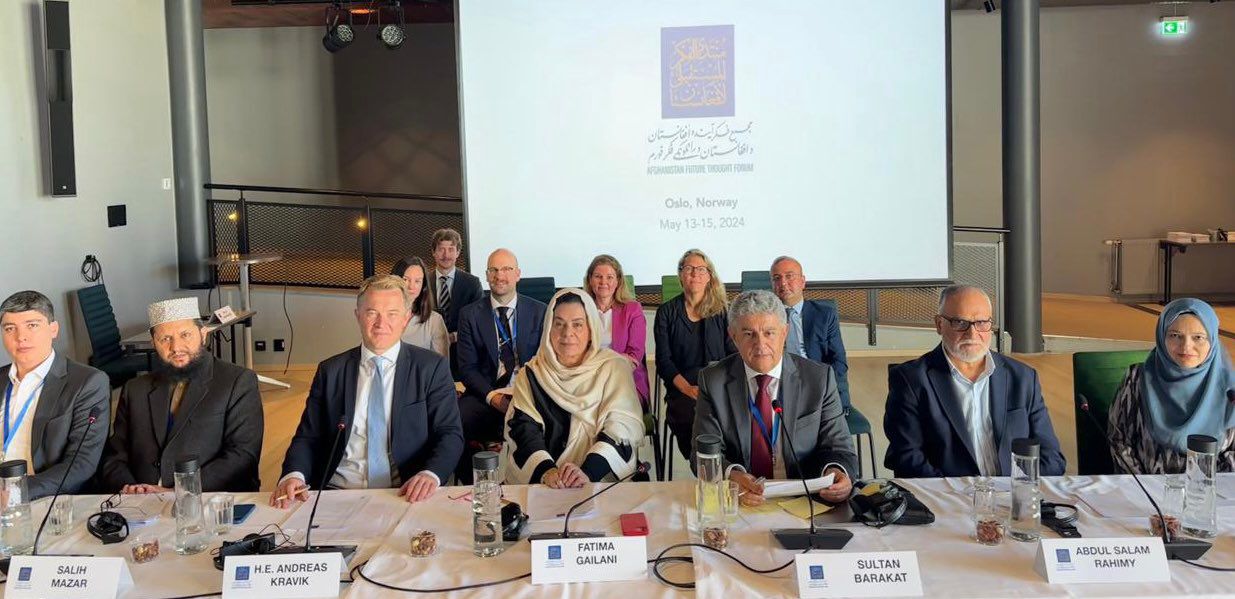
HBKU’s College of Public Policy Convenes the Ninth Session of the Afghanistan Future Thought Forum
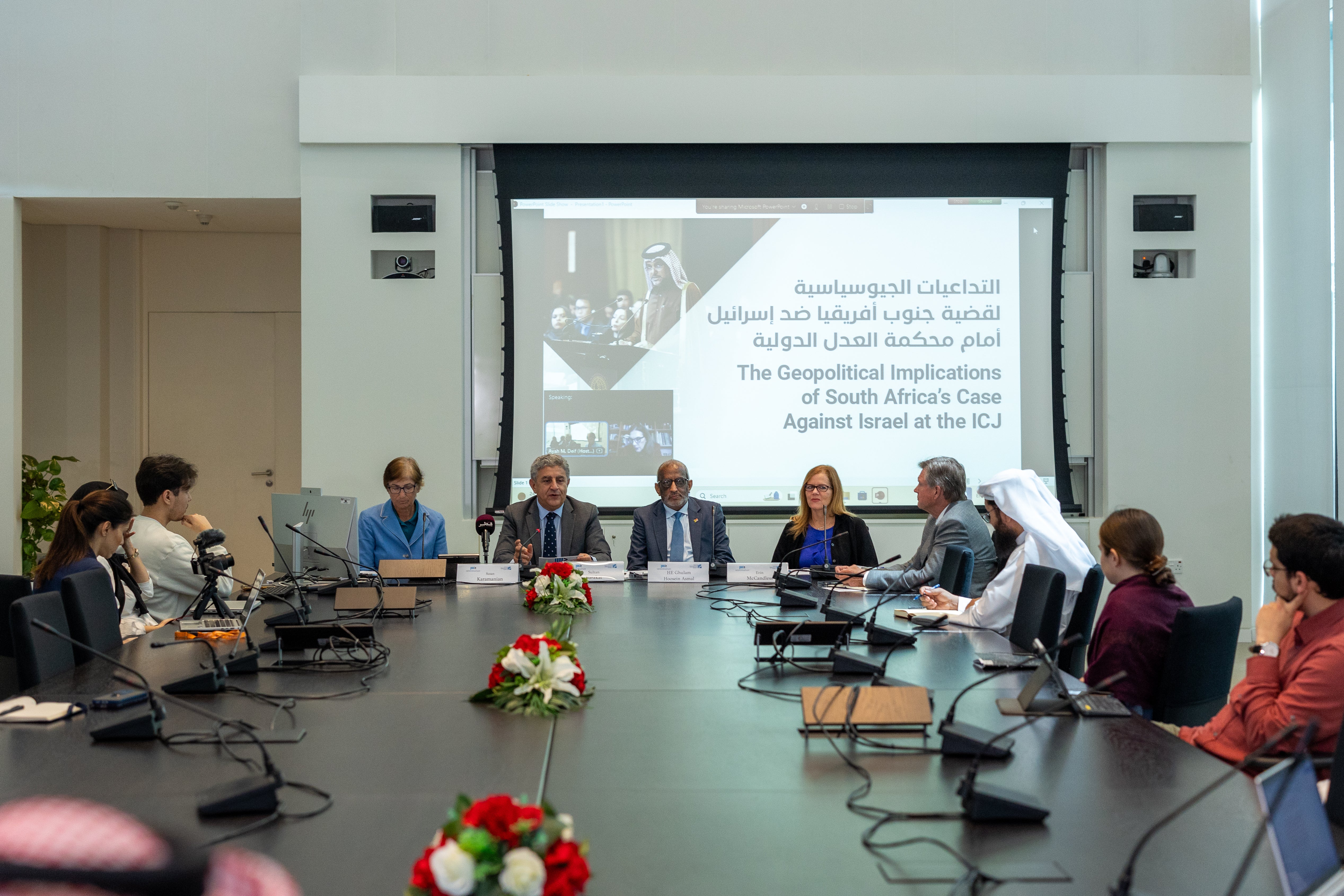
GISR Panel Analyzes Geopolitical Implications of South Africa’s Case against Israel at the ICJ

CPP Welcomes Erin McCandless as Distinguished Visiting Professor of Public Value

CPP, US Embassy in Doha, and DeapQatar Conservation Co-Host Circular Economy Lecture

CPP, Doha Institute for Graduate Studies, and University of Birmingham Co-Host Symposium on Public Policy in the Gulf

HBKU’s College of Public Policy Invites Global Academics and Experts for Conference on Rebuilding Higher Education in Gaza

The United Nations Office of Counter-Terrorism and Leading Universities in Qatar Launch the Doha Youth Parliamentary Forum

HBKU’s CPP and Geneva Graduate Institute Launch 2024-2025 Executive Programs in Development Policies and Practices

HBKU’s CPP Celebrates #TogetherinQatar Awards Ceremony after Signing MoU with the International Organization for Migration

HBKU Professor Advises Global Policymakers on the Challenge of Engagement with the Taliban’s De-Facto Government

HBKU’s College of Public Policy Convenes the Ninth Session of the Afghanistan Future Thought Forum

GISR Panel Analyzes Geopolitical Implications of South Africa’s Case against Israel at the ICJ

CPP Welcomes Erin McCandless as Distinguished Visiting Professor of Public Value

CPP, US Embassy in Doha, and DeapQatar Conservation Co-Host Circular Economy Lecture

CPP, Doha Institute for Graduate Studies, and University of Birmingham Co-Host Symposium on Public Policy in the Gulf

HBKU’s College of Public Policy Invites Global Academics and Experts for Conference on Rebuilding Higher Education in Gaza

The United Nations Office of Counter-Terrorism and Leading Universities in Qatar Launch the Doha Youth Parliamentary Forum

HBKU’s CPP and Geneva Graduate Institute Launch 2024-2025 Executive Programs in Development Policies and Practices

HBKU’s CPP Celebrates #TogetherinQatar Awards Ceremony after Signing MoU with the International Organization for Migration

HBKU Professor Advises Global Policymakers on the Challenge of Engagement with the Taliban’s De-Facto Government

HBKU’s College of Public Policy Convenes the Ninth Session of the Afghanistan Future Thought Forum

GISR Panel Analyzes Geopolitical Implications of South Africa’s Case against Israel at the ICJ

CPP Welcomes Erin McCandless as Distinguished Visiting Professor of Public Value

CPP, US Embassy in Doha, and DeapQatar Conservation Co-Host Circular Economy Lecture

CPP, Doha Institute for Graduate Studies, and University of Birmingham Co-Host Symposium on Public Policy in the Gulf

HBKU’s College of Public Policy Invites Global Academics and Experts for Conference on Rebuilding Higher Education in Gaza

The United Nations Office of Counter-Terrorism and Leading Universities in Qatar Launch the Doha Youth Parliamentary Forum

HBKU’s CPP and Geneva Graduate Institute Launch 2024-2025 Executive Programs in Development Policies and Practices

HBKU’s CPP Celebrates #TogetherinQatar Awards Ceremony after Signing MoU with the International Organization for Migration

HBKU Professor Advises Global Policymakers on the Challenge of Engagement with the Taliban’s De-Facto Government

HBKU’s College of Public Policy Convenes the Ninth Session of the Afghanistan Future Thought Forum

GISR Panel Analyzes Geopolitical Implications of South Africa’s Case against Israel at the ICJ

CPP Welcomes Erin McCandless as Distinguished Visiting Professor of Public Value

CPP, US Embassy in Doha, and DeapQatar Conservation Co-Host Circular Economy Lecture

CPP, Doha Institute for Graduate Studies, and University of Birmingham Co-Host Symposium on Public Policy in the Gulf

HBKU’s College of Public Policy Invites Global Academics and Experts for Conference on Rebuilding Higher Education in Gaza

The United Nations Office of Counter-Terrorism and Leading Universities in Qatar Launch the Doha Youth Parliamentary Forum

HBKU’s CPP and Geneva Graduate Institute Launch 2024-2025 Executive Programs in Development Policies and Practices

HBKU’s CPP Celebrates #TogetherinQatar Awards Ceremony after Signing MoU with the International Organization for Migration

HBKU Professor Advises Global Policymakers on the Challenge of Engagement with the Taliban’s De-Facto Government

HBKU’s College of Public Policy Convenes the Ninth Session of the Afghanistan Future Thought Forum

GISR Panel Analyzes Geopolitical Implications of South Africa’s Case against Israel at the ICJ

CPP Welcomes Erin McCandless as Distinguished Visiting Professor of Public Value

CPP, US Embassy in Doha, and DeapQatar Conservation Co-Host Circular Economy Lecture

CPP, Doha Institute for Graduate Studies, and University of Birmingham Co-Host Symposium on Public Policy in the Gulf

HBKU’s College of Public Policy Invites Global Academics and Experts for Conference on Rebuilding Higher Education in Gaza

The United Nations Office of Counter-Terrorism and Leading Universities in Qatar Launch the Doha Youth Parliamentary Forum

HBKU’s CPP and Geneva Graduate Institute Launch 2024-2025 Executive Programs in Development Policies and Practices

HBKU’s CPP Celebrates #TogetherinQatar Awards Ceremony after Signing MoU with the International Organization for Migration

HBKU Professor Advises Global Policymakers on the Challenge of Engagement with the Taliban’s De-Facto Government

HBKU’s College of Public Policy Convenes the Ninth Session of the Afghanistan Future Thought Forum

GISR Panel Analyzes Geopolitical Implications of South Africa’s Case against Israel at the ICJ

CPP Welcomes Erin McCandless as Distinguished Visiting Professor of Public Value

CPP, US Embassy in Doha, and DeapQatar Conservation Co-Host Circular Economy Lecture

CPP, Doha Institute for Graduate Studies, and University of Birmingham Co-Host Symposium on Public Policy in the Gulf

HBKU’s College of Public Policy Invites Global Academics and Experts for Conference on Rebuilding Higher Education in Gaza

The United Nations Office of Counter-Terrorism and Leading Universities in Qatar Launch the Doha Youth Parliamentary Forum

HBKU’s CPP and Geneva Graduate Institute Launch 2024-2025 Executive Programs in Development Policies and Practices

HBKU’s CPP Celebrates #TogetherinQatar Awards Ceremony after Signing MoU with the International Organization for Migration

HBKU Professor Advises Global Policymakers on the Challenge of Engagement with the Taliban’s De-Facto Government

HBKU’s College of Public Policy Convenes the Ninth Session of the Afghanistan Future Thought Forum

GISR Panel Analyzes Geopolitical Implications of South Africa’s Case against Israel at the ICJ

CPP Welcomes Erin McCandless as Distinguished Visiting Professor of Public Value

CPP, US Embassy in Doha, and DeapQatar Conservation Co-Host Circular Economy Lecture

CPP, Doha Institute for Graduate Studies, and University of Birmingham Co-Host Symposium on Public Policy in the Gulf

HBKU’s College of Public Policy Invites Global Academics and Experts for Conference on Rebuilding Higher Education in Gaza

The United Nations Office of Counter-Terrorism and Leading Universities in Qatar Launch the Doha Youth Parliamentary Forum

HBKU’s CPP and Geneva Graduate Institute Launch 2024-2025 Executive Programs in Development Policies and Practices

HBKU’s CPP Celebrates #TogetherinQatar Awards Ceremony after Signing MoU with the International Organization for Migration

HBKU Professor Advises Global Policymakers on the Challenge of Engagement with the Taliban’s De-Facto Government

HBKU’s College of Public Policy Convenes the Ninth Session of the Afghanistan Future Thought Forum

GISR Panel Analyzes Geopolitical Implications of South Africa’s Case against Israel at the ICJ

CPP Welcomes Erin McCandless as Distinguished Visiting Professor of Public Value

CPP, US Embassy in Doha, and DeapQatar Conservation Co-Host Circular Economy Lecture

CPP, Doha Institute for Graduate Studies, and University of Birmingham Co-Host Symposium on Public Policy in the Gulf

HBKU’s College of Public Policy Invites Global Academics and Experts for Conference on Rebuilding Higher Education in Gaza

The United Nations Office of Counter-Terrorism and Leading Universities in Qatar Launch the Doha Youth Parliamentary Forum

HBKU’s CPP and Geneva Graduate Institute Launch 2024-2025 Executive Programs in Development Policies and Practices

HBKU’s CPP Celebrates #TogetherinQatar Awards Ceremony after Signing MoU with the International Organization for Migration

HBKU Professor Advises Global Policymakers on the Challenge of Engagement with the Taliban’s De-Facto Government

HBKU’s College of Public Policy Convenes the Ninth Session of the Afghanistan Future Thought Forum

GISR Panel Analyzes Geopolitical Implications of South Africa’s Case against Israel at the ICJ

CPP Welcomes Erin McCandless as Distinguished Visiting Professor of Public Value

CPP, US Embassy in Doha, and DeapQatar Conservation Co-Host Circular Economy Lecture

CPP, Doha Institute for Graduate Studies, and University of Birmingham Co-Host Symposium on Public Policy in the Gulf

HBKU’s College of Public Policy Invites Global Academics and Experts for Conference on Rebuilding Higher Education in Gaza

The United Nations Office of Counter-Terrorism and Leading Universities in Qatar Launch the Doha Youth Parliamentary Forum

HBKU’s CPP and Geneva Graduate Institute Launch 2024-2025 Executive Programs in Development Policies and Practices

HBKU’s CPP Celebrates #TogetherinQatar Awards Ceremony after Signing MoU with the International Organization for Migration

HBKU Professor Advises Global Policymakers on the Challenge of Engagement with the Taliban’s De-Facto Government

HBKU’s College of Public Policy Convenes the Ninth Session of the Afghanistan Future Thought Forum

GISR Panel Analyzes Geopolitical Implications of South Africa’s Case against Israel at the ICJ

CPP Welcomes Erin McCandless as Distinguished Visiting Professor of Public Value

CPP, US Embassy in Doha, and DeapQatar Conservation Co-Host Circular Economy Lecture

CPP, Doha Institute for Graduate Studies, and University of Birmingham Co-Host Symposium on Public Policy in the Gulf

HBKU’s College of Public Policy Invites Global Academics and Experts for Conference on Rebuilding Higher Education in Gaza

The United Nations Office of Counter-Terrorism and Leading Universities in Qatar Launch the Doha Youth Parliamentary Forum

HBKU’s CPP and Geneva Graduate Institute Launch 2024-2025 Executive Programs in Development Policies and Practices

HBKU’s CPP Celebrates #TogetherinQatar Awards Ceremony after Signing MoU with the International Organization for Migration

HBKU Professor Advises Global Policymakers on the Challenge of Engagement with the Taliban’s De-Facto Government

HBKU’s College of Public Policy Convenes the Ninth Session of the Afghanistan Future Thought Forum

GISR Panel Analyzes Geopolitical Implications of South Africa’s Case against Israel at the ICJ

CPP Welcomes Erin McCandless as Distinguished Visiting Professor of Public Value

CPP, US Embassy in Doha, and DeapQatar Conservation Co-Host Circular Economy Lecture

CPP, Doha Institute for Graduate Studies, and University of Birmingham Co-Host Symposium on Public Policy in the Gulf

HBKU’s College of Public Policy Invites Global Academics and Experts for Conference on Rebuilding Higher Education in Gaza

The United Nations Office of Counter-Terrorism and Leading Universities in Qatar Launch the Doha Youth Parliamentary Forum

HBKU’s CPP and Geneva Graduate Institute Launch 2024-2025 Executive Programs in Development Policies and Practices

HBKU’s CPP Celebrates #TogetherinQatar Awards Ceremony after Signing MoU with the International Organization for Migration

HBKU Professor Advises Global Policymakers on the Challenge of Engagement with the Taliban’s De-Facto Government

HBKU’s College of Public Policy Convenes the Ninth Session of the Afghanistan Future Thought Forum

GISR Panel Analyzes Geopolitical Implications of South Africa’s Case against Israel at the ICJ

CPP Welcomes Erin McCandless as Distinguished Visiting Professor of Public Value

CPP, US Embassy in Doha, and DeapQatar Conservation Co-Host Circular Economy Lecture

CPP, Doha Institute for Graduate Studies, and University of Birmingham Co-Host Symposium on Public Policy in the Gulf

HBKU’s College of Public Policy Invites Global Academics and Experts for Conference on Rebuilding Higher Education in Gaza

The United Nations Office of Counter-Terrorism and Leading Universities in Qatar Launch the Doha Youth Parliamentary Forum

HBKU’s CPP and Geneva Graduate Institute Launch 2024-2025 Executive Programs in Development Policies and Practices

HBKU’s CPP Celebrates #TogetherinQatar Awards Ceremony after Signing MoU with the International Organization for Migration

HBKU Professor Advises Global Policymakers on the Challenge of Engagement with the Taliban’s De-Facto Government

HBKU’s College of Public Policy Convenes the Ninth Session of the Afghanistan Future Thought Forum

GISR Panel Analyzes Geopolitical Implications of South Africa’s Case against Israel at the ICJ

CPP Welcomes Erin McCandless as Distinguished Visiting Professor of Public Value

CPP, US Embassy in Doha, and DeapQatar Conservation Co-Host Circular Economy Lecture

CPP, Doha Institute for Graduate Studies, and University of Birmingham Co-Host Symposium on Public Policy in the Gulf

HBKU’s College of Public Policy Invites Global Academics and Experts for Conference on Rebuilding Higher Education in Gaza

The United Nations Office of Counter-Terrorism and Leading Universities in Qatar Launch the Doha Youth Parliamentary Forum

HBKU’s CPP and Geneva Graduate Institute Launch 2024-2025 Executive Programs in Development Policies and Practices

HBKU’s CPP Celebrates #TogetherinQatar Awards Ceremony after Signing MoU with the International Organization for Migration

HBKU Professor Advises Global Policymakers on the Challenge of Engagement with the Taliban’s De-Facto Government

HBKU’s College of Public Policy Convenes the Ninth Session of the Afghanistan Future Thought Forum

GISR Panel Analyzes Geopolitical Implications of South Africa’s Case against Israel at the ICJ

CPP Welcomes Erin McCandless as Distinguished Visiting Professor of Public Value

CPP, US Embassy in Doha, and DeapQatar Conservation Co-Host Circular Economy Lecture

CPP, Doha Institute for Graduate Studies, and University of Birmingham Co-Host Symposium on Public Policy in the Gulf

HBKU’s College of Public Policy Invites Global Academics and Experts for Conference on Rebuilding Higher Education in Gaza

The United Nations Office of Counter-Terrorism and Leading Universities in Qatar Launch the Doha Youth Parliamentary Forum

HBKU’s CPP and Geneva Graduate Institute Launch 2024-2025 Executive Programs in Development Policies and Practices

HBKU’s CPP Celebrates #TogetherinQatar Awards Ceremony after Signing MoU with the International Organization for Migration

HBKU Professor Advises Global Policymakers on the Challenge of Engagement with the Taliban’s De-Facto Government

HBKU’s College of Public Policy Convenes the Ninth Session of the Afghanistan Future Thought Forum

GISR Panel Analyzes Geopolitical Implications of South Africa’s Case against Israel at the ICJ

CPP Welcomes Erin McCandless as Distinguished Visiting Professor of Public Value

CPP, US Embassy in Doha, and DeapQatar Conservation Co-Host Circular Economy Lecture

CPP, Doha Institute for Graduate Studies, and University of Birmingham Co-Host Symposium on Public Policy in the Gulf

HBKU’s College of Public Policy Invites Global Academics and Experts for Conference on Rebuilding Higher Education in Gaza

The United Nations Office of Counter-Terrorism and Leading Universities in Qatar Launch the Doha Youth Parliamentary Forum

HBKU’s CPP and Geneva Graduate Institute Launch 2024-2025 Executive Programs in Development Policies and Practices

HBKU’s CPP Celebrates #TogetherinQatar Awards Ceremony after Signing MoU with the International Organization for Migration

HBKU Professor Advises Global Policymakers on the Challenge of Engagement with the Taliban’s De-Facto Government

HBKU’s College of Public Policy Convenes the Ninth Session of the Afghanistan Future Thought Forum

GISR Panel Analyzes Geopolitical Implications of South Africa’s Case against Israel at the ICJ

CPP Welcomes Erin McCandless as Distinguished Visiting Professor of Public Value

CPP, US Embassy in Doha, and DeapQatar Conservation Co-Host Circular Economy Lecture

CPP, Doha Institute for Graduate Studies, and University of Birmingham Co-Host Symposium on Public Policy in the Gulf

HBKU’s College of Public Policy Invites Global Academics and Experts for Conference on Rebuilding Higher Education in Gaza

The United Nations Office of Counter-Terrorism and Leading Universities in Qatar Launch the Doha Youth Parliamentary Forum

HBKU’s CPP and Geneva Graduate Institute Launch 2024-2025 Executive Programs in Development Policies and Practices

HBKU’s CPP Celebrates #TogetherinQatar Awards Ceremony after Signing MoU with the International Organization for Migration

HBKU Professor Advises Global Policymakers on the Challenge of Engagement with the Taliban’s De-Facto Government

HBKU’s College of Public Policy Convenes the Ninth Session of the Afghanistan Future Thought Forum

GISR Panel Analyzes Geopolitical Implications of South Africa’s Case against Israel at the ICJ

CPP Welcomes Erin McCandless as Distinguished Visiting Professor of Public Value

CPP, US Embassy in Doha, and DeapQatar Conservation Co-Host Circular Economy Lecture

CPP, Doha Institute for Graduate Studies, and University of Birmingham Co-Host Symposium on Public Policy in the Gulf

HBKU’s College of Public Policy Invites Global Academics and Experts for Conference on Rebuilding Higher Education in Gaza

The United Nations Office of Counter-Terrorism and Leading Universities in Qatar Launch the Doha Youth Parliamentary Forum

HBKU’s CPP and Geneva Graduate Institute Launch 2024-2025 Executive Programs in Development Policies and Practices

HBKU’s CPP Celebrates #TogetherinQatar Awards Ceremony after Signing MoU with the International Organization for Migration

HBKU Professor Advises Global Policymakers on the Challenge of Engagement with the Taliban’s De-Facto Government

HBKU’s College of Public Policy Convenes the Ninth Session of the Afghanistan Future Thought Forum

GISR Panel Analyzes Geopolitical Implications of South Africa’s Case against Israel at the ICJ

CPP Welcomes Erin McCandless as Distinguished Visiting Professor of Public Value

CPP, US Embassy in Doha, and DeapQatar Conservation Co-Host Circular Economy Lecture

CPP, Doha Institute for Graduate Studies, and University of Birmingham Co-Host Symposium on Public Policy in the Gulf

HBKU’s College of Public Policy Invites Global Academics and Experts for Conference on Rebuilding Higher Education in Gaza

The United Nations Office of Counter-Terrorism and Leading Universities in Qatar Launch the Doha Youth Parliamentary Forum

HBKU’s CPP and Geneva Graduate Institute Launch 2024-2025 Executive Programs in Development Policies and Practices

HBKU’s CPP Celebrates #TogetherinQatar Awards Ceremony after Signing MoU with the International Organization for Migration

HBKU Professor Advises Global Policymakers on the Challenge of Engagement with the Taliban’s De-Facto Government

HBKU’s College of Public Policy Convenes the Ninth Session of the Afghanistan Future Thought Forum

GISR Panel Analyzes Geopolitical Implications of South Africa’s Case against Israel at the ICJ

CPP Welcomes Erin McCandless as Distinguished Visiting Professor of Public Value

CPP, US Embassy in Doha, and DeapQatar Conservation Co-Host Circular Economy Lecture

CPP, Doha Institute for Graduate Studies, and University of Birmingham Co-Host Symposium on Public Policy in the Gulf

HBKU’s College of Public Policy Invites Global Academics and Experts for Conference on Rebuilding Higher Education in Gaza

The United Nations Office of Counter-Terrorism and Leading Universities in Qatar Launch the Doha Youth Parliamentary Forum

HBKU’s CPP and Geneva Graduate Institute Launch 2024-2025 Executive Programs in Development Policies and Practices

HBKU’s CPP Celebrates #TogetherinQatar Awards Ceremony after Signing MoU with the International Organization for Migration

HBKU Professor Advises Global Policymakers on the Challenge of Engagement with the Taliban’s De-Facto Government

HBKU’s College of Public Policy Convenes the Ninth Session of the Afghanistan Future Thought Forum

GISR Panel Analyzes Geopolitical Implications of South Africa’s Case against Israel at the ICJ

CPP Welcomes Erin McCandless as Distinguished Visiting Professor of Public Value

CPP, US Embassy in Doha, and DeapQatar Conservation Co-Host Circular Economy Lecture

CPP, Doha Institute for Graduate Studies, and University of Birmingham Co-Host Symposium on Public Policy in the Gulf

HBKU’s College of Public Policy Invites Global Academics and Experts for Conference on Rebuilding Higher Education in Gaza

The United Nations Office of Counter-Terrorism and Leading Universities in Qatar Launch the Doha Youth Parliamentary Forum

HBKU’s CPP and Geneva Graduate Institute Launch 2024-2025 Executive Programs in Development Policies and Practices

HBKU’s CPP Celebrates #TogetherinQatar Awards Ceremony after Signing MoU with the International Organization for Migration

HBKU Professor Advises Global Policymakers on the Challenge of Engagement with the Taliban’s De-Facto Government

HBKU’s College of Public Policy Convenes the Ninth Session of the Afghanistan Future Thought Forum

GISR Panel Analyzes Geopolitical Implications of South Africa’s Case against Israel at the ICJ

CPP Welcomes Erin McCandless as Distinguished Visiting Professor of Public Value

CPP, US Embassy in Doha, and DeapQatar Conservation Co-Host Circular Economy Lecture

CPP, Doha Institute for Graduate Studies, and University of Birmingham Co-Host Symposium on Public Policy in the Gulf

HBKU’s College of Public Policy Invites Global Academics and Experts for Conference on Rebuilding Higher Education in Gaza

The United Nations Office of Counter-Terrorism and Leading Universities in Qatar Launch the Doha Youth Parliamentary Forum

HBKU’s CPP and Geneva Graduate Institute Launch 2024-2025 Executive Programs in Development Policies and Practices

HBKU’s CPP Celebrates #TogetherinQatar Awards Ceremony after Signing MoU with the International Organization for Migration

HBKU Professor Advises Global Policymakers on the Challenge of Engagement with the Taliban’s De-Facto Government

HBKU’s College of Public Policy Convenes the Ninth Session of the Afghanistan Future Thought Forum

GISR Panel Analyzes Geopolitical Implications of South Africa’s Case against Israel at the ICJ

CPP Welcomes Erin McCandless as Distinguished Visiting Professor of Public Value

CPP, US Embassy in Doha, and DeapQatar Conservation Co-Host Circular Economy Lecture

CPP, Doha Institute for Graduate Studies, and University of Birmingham Co-Host Symposium on Public Policy in the Gulf

HBKU’s College of Public Policy Invites Global Academics and Experts for Conference on Rebuilding Higher Education in Gaza

The United Nations Office of Counter-Terrorism and Leading Universities in Qatar Launch the Doha Youth Parliamentary Forum

HBKU’s CPP and Geneva Graduate Institute Launch 2024-2025 Executive Programs in Development Policies and Practices

HBKU’s CPP Celebrates #TogetherinQatar Awards Ceremony after Signing MoU with the International Organization for Migration

HBKU Professor Advises Global Policymakers on the Challenge of Engagement with the Taliban’s De-Facto Government

HBKU’s College of Public Policy Convenes the Ninth Session of the Afghanistan Future Thought Forum

GISR Panel Analyzes Geopolitical Implications of South Africa’s Case against Israel at the ICJ

CPP Welcomes Erin McCandless as Distinguished Visiting Professor of Public Value

CPP, US Embassy in Doha, and DeapQatar Conservation Co-Host Circular Economy Lecture

CPP, Doha Institute for Graduate Studies, and University of Birmingham Co-Host Symposium on Public Policy in the Gulf

HBKU’s College of Public Policy Invites Global Academics and Experts for Conference on Rebuilding Higher Education in Gaza

The United Nations Office of Counter-Terrorism and Leading Universities in Qatar Launch the Doha Youth Parliamentary Forum

HBKU’s CPP and Geneva Graduate Institute Launch 2024-2025 Executive Programs in Development Policies and Practices

HBKU’s CPP Celebrates #TogetherinQatar Awards Ceremony after Signing MoU with the International Organization for Migration

HBKU Professor Advises Global Policymakers on the Challenge of Engagement with the Taliban’s De-Facto Government

HBKU’s College of Public Policy Convenes the Ninth Session of the Afghanistan Future Thought Forum

GISR Panel Analyzes Geopolitical Implications of South Africa’s Case against Israel at the ICJ

CPP Welcomes Erin McCandless as Distinguished Visiting Professor of Public Value

CPP, US Embassy in Doha, and DeapQatar Conservation Co-Host Circular Economy Lecture

CPP, Doha Institute for Graduate Studies, and University of Birmingham Co-Host Symposium on Public Policy in the Gulf

HBKU’s College of Public Policy Invites Global Academics and Experts for Conference on Rebuilding Higher Education in Gaza

The United Nations Office of Counter-Terrorism and Leading Universities in Qatar Launch the Doha Youth Parliamentary Forum

HBKU’s CPP and Geneva Graduate Institute Launch 2024-2025 Executive Programs in Development Policies and Practices

HBKU’s CPP Celebrates #TogetherinQatar Awards Ceremony after Signing MoU with the International Organization for Migration

HBKU Professor Advises Global Policymakers on the Challenge of Engagement with the Taliban’s De-Facto Government

HBKU’s College of Public Policy Convenes the Ninth Session of the Afghanistan Future Thought Forum

GISR Panel Analyzes Geopolitical Implications of South Africa’s Case against Israel at the ICJ

CPP Welcomes Erin McCandless as Distinguished Visiting Professor of Public Value

CPP, US Embassy in Doha, and DeapQatar Conservation Co-Host Circular Economy Lecture

CPP, Doha Institute for Graduate Studies, and University of Birmingham Co-Host Symposium on Public Policy in the Gulf

HBKU’s College of Public Policy Invites Global Academics and Experts for Conference on Rebuilding Higher Education in Gaza

The United Nations Office of Counter-Terrorism and Leading Universities in Qatar Launch the Doha Youth Parliamentary Forum

HBKU’s CPP and Geneva Graduate Institute Launch 2024-2025 Executive Programs in Development Policies and Practices

HBKU’s CPP Celebrates #TogetherinQatar Awards Ceremony after Signing MoU with the International Organization for Migration

HBKU Professor Advises Global Policymakers on the Challenge of Engagement with the Taliban’s De-Facto Government

HBKU’s College of Public Policy Convenes the Ninth Session of the Afghanistan Future Thought Forum

GISR Panel Analyzes Geopolitical Implications of South Africa’s Case against Israel at the ICJ

CPP Welcomes Erin McCandless as Distinguished Visiting Professor of Public Value

CPP, US Embassy in Doha, and DeapQatar Conservation Co-Host Circular Economy Lecture

CPP, Doha Institute for Graduate Studies, and University of Birmingham Co-Host Symposium on Public Policy in the Gulf

HBKU’s College of Public Policy Invites Global Academics and Experts for Conference on Rebuilding Higher Education in Gaza

The United Nations Office of Counter-Terrorism and Leading Universities in Qatar Launch the Doha Youth Parliamentary Forum

HBKU’s CPP and Geneva Graduate Institute Launch 2024-2025 Executive Programs in Development Policies and Practices

HBKU’s CPP Celebrates #TogetherinQatar Awards Ceremony after Signing MoU with the International Organization for Migration

HBKU Professor Advises Global Policymakers on the Challenge of Engagement with the Taliban’s De-Facto Government

HBKU’s College of Public Policy Convenes the Ninth Session of the Afghanistan Future Thought Forum

GISR Panel Analyzes Geopolitical Implications of South Africa’s Case against Israel at the ICJ

CPP Welcomes Erin McCandless as Distinguished Visiting Professor of Public Value

CPP, US Embassy in Doha, and DeapQatar Conservation Co-Host Circular Economy Lecture

CPP, Doha Institute for Graduate Studies, and University of Birmingham Co-Host Symposium on Public Policy in the Gulf

HBKU’s College of Public Policy Invites Global Academics and Experts for Conference on Rebuilding Higher Education in Gaza

The United Nations Office of Counter-Terrorism and Leading Universities in Qatar Launch the Doha Youth Parliamentary Forum

HBKU’s CPP and Geneva Graduate Institute Launch 2024-2025 Executive Programs in Development Policies and Practices

HBKU’s CPP Celebrates #TogetherinQatar Awards Ceremony after Signing MoU with the International Organization for Migration

HBKU Professor Advises Global Policymakers on the Challenge of Engagement with the Taliban’s De-Facto Government

HBKU’s College of Public Policy Convenes the Ninth Session of the Afghanistan Future Thought Forum

GISR Panel Analyzes Geopolitical Implications of South Africa’s Case against Israel at the ICJ

CPP Welcomes Erin McCandless as Distinguished Visiting Professor of Public Value

CPP, US Embassy in Doha, and DeapQatar Conservation Co-Host Circular Economy Lecture

CPP, Doha Institute for Graduate Studies, and University of Birmingham Co-Host Symposium on Public Policy in the Gulf

HBKU’s College of Public Policy Invites Global Academics and Experts for Conference on Rebuilding Higher Education in Gaza

The United Nations Office of Counter-Terrorism and Leading Universities in Qatar Launch the Doha Youth Parliamentary Forum

HBKU’s CPP and Geneva Graduate Institute Launch 2024-2025 Executive Programs in Development Policies and Practices

HBKU’s CPP Celebrates #TogetherinQatar Awards Ceremony after Signing MoU with the International Organization for Migration

HBKU Professor Advises Global Policymakers on the Challenge of Engagement with the Taliban’s De-Facto Government

HBKU’s College of Public Policy Convenes the Ninth Session of the Afghanistan Future Thought Forum

GISR Panel Analyzes Geopolitical Implications of South Africa’s Case against Israel at the ICJ

CPP Welcomes Erin McCandless as Distinguished Visiting Professor of Public Value

CPP, US Embassy in Doha, and DeapQatar Conservation Co-Host Circular Economy Lecture

CPP, Doha Institute for Graduate Studies, and University of Birmingham Co-Host Symposium on Public Policy in the Gulf

HBKU’s College of Public Policy Invites Global Academics and Experts for Conference on Rebuilding Higher Education in Gaza

The United Nations Office of Counter-Terrorism and Leading Universities in Qatar Launch the Doha Youth Parliamentary Forum

HBKU’s CPP and Geneva Graduate Institute Launch 2024-2025 Executive Programs in Development Policies and Practices

HBKU’s CPP Celebrates #TogetherinQatar Awards Ceremony after Signing MoU with the International Organization for Migration

HBKU Professor Advises Global Policymakers on the Challenge of Engagement with the Taliban’s De-Facto Government

HBKU’s College of Public Policy Convenes the Ninth Session of the Afghanistan Future Thought Forum

GISR Panel Analyzes Geopolitical Implications of South Africa’s Case against Israel at the ICJ

CPP Welcomes Erin McCandless as Distinguished Visiting Professor of Public Value

CPP, US Embassy in Doha, and DeapQatar Conservation Co-Host Circular Economy Lecture

CPP, Doha Institute for Graduate Studies, and University of Birmingham Co-Host Symposium on Public Policy in the Gulf

HBKU’s College of Public Policy Invites Global Academics and Experts for Conference on Rebuilding Higher Education in Gaza

The United Nations Office of Counter-Terrorism and Leading Universities in Qatar Launch the Doha Youth Parliamentary Forum

HBKU’s CPP and Geneva Graduate Institute Launch 2024-2025 Executive Programs in Development Policies and Practices

HBKU’s CPP Celebrates #TogetherinQatar Awards Ceremony after Signing MoU with the International Organization for Migration

HBKU Professor Advises Global Policymakers on the Challenge of Engagement with the Taliban’s De-Facto Government

HBKU’s College of Public Policy Convenes the Ninth Session of the Afghanistan Future Thought Forum

GISR Panel Analyzes Geopolitical Implications of South Africa’s Case against Israel at the ICJ

CPP Welcomes Erin McCandless as Distinguished Visiting Professor of Public Value

CPP, US Embassy in Doha, and DeapQatar Conservation Co-Host Circular Economy Lecture

CPP, Doha Institute for Graduate Studies, and University of Birmingham Co-Host Symposium on Public Policy in the Gulf

HBKU’s College of Public Policy Invites Global Academics and Experts for Conference on Rebuilding Higher Education in Gaza

The United Nations Office of Counter-Terrorism and Leading Universities in Qatar Launch the Doha Youth Parliamentary Forum

HBKU’s CPP and Geneva Graduate Institute Launch 2024-2025 Executive Programs in Development Policies and Practices

HBKU’s CPP Celebrates #TogetherinQatar Awards Ceremony after Signing MoU with the International Organization for Migration

HBKU Professor Advises Global Policymakers on the Challenge of Engagement with the Taliban’s De-Facto Government

HBKU’s College of Public Policy Convenes the Ninth Session of the Afghanistan Future Thought Forum

GISR Panel Analyzes Geopolitical Implications of South Africa’s Case against Israel at the ICJ

CPP Welcomes Erin McCandless as Distinguished Visiting Professor of Public Value

CPP, US Embassy in Doha, and DeapQatar Conservation Co-Host Circular Economy Lecture

CPP, Doha Institute for Graduate Studies, and University of Birmingham Co-Host Symposium on Public Policy in the Gulf

HBKU’s College of Public Policy Invites Global Academics and Experts for Conference on Rebuilding Higher Education in Gaza

The United Nations Office of Counter-Terrorism and Leading Universities in Qatar Launch the Doha Youth Parliamentary Forum

HBKU’s CPP and Geneva Graduate Institute Launch 2024-2025 Executive Programs in Development Policies and Practices

HBKU’s CPP Celebrates #TogetherinQatar Awards Ceremony after Signing MoU with the International Organization for Migration

HBKU Professor Advises Global Policymakers on the Challenge of Engagement with the Taliban’s De-Facto Government

HBKU’s College of Public Policy Convenes the Ninth Session of the Afghanistan Future Thought Forum

GISR Panel Analyzes Geopolitical Implications of South Africa’s Case against Israel at the ICJ

CPP Welcomes Erin McCandless as Distinguished Visiting Professor of Public Value

CPP, US Embassy in Doha, and DeapQatar Conservation Co-Host Circular Economy Lecture

CPP, Doha Institute for Graduate Studies, and University of Birmingham Co-Host Symposium on Public Policy in the Gulf

HBKU’s College of Public Policy Invites Global Academics and Experts for Conference on Rebuilding Higher Education in Gaza

The United Nations Office of Counter-Terrorism and Leading Universities in Qatar Launch the Doha Youth Parliamentary Forum

HBKU’s CPP and Geneva Graduate Institute Launch 2024-2025 Executive Programs in Development Policies and Practices

HBKU’s CPP Celebrates #TogetherinQatar Awards Ceremony after Signing MoU with the International Organization for Migration

HBKU Professor Advises Global Policymakers on the Challenge of Engagement with the Taliban’s De-Facto Government

HBKU’s College of Public Policy Convenes the Ninth Session of the Afghanistan Future Thought Forum

GISR Panel Analyzes Geopolitical Implications of South Africa’s Case against Israel at the ICJ

CPP Welcomes Erin McCandless as Distinguished Visiting Professor of Public Value

CPP, US Embassy in Doha, and DeapQatar Conservation Co-Host Circular Economy Lecture

CPP, Doha Institute for Graduate Studies, and University of Birmingham Co-Host Symposium on Public Policy in the Gulf

HBKU’s College of Public Policy Invites Global Academics and Experts for Conference on Rebuilding Higher Education in Gaza

The United Nations Office of Counter-Terrorism and Leading Universities in Qatar Launch the Doha Youth Parliamentary Forum

HBKU’s CPP and Geneva Graduate Institute Launch 2024-2025 Executive Programs in Development Policies and Practices

HBKU’s CPP Celebrates #TogetherinQatar Awards Ceremony after Signing MoU with the International Organization for Migration

HBKU Professor Advises Global Policymakers on the Challenge of Engagement with the Taliban’s De-Facto Government

HBKU’s College of Public Policy Convenes the Ninth Session of the Afghanistan Future Thought Forum

GISR Panel Analyzes Geopolitical Implications of South Africa’s Case against Israel at the ICJ

CPP Welcomes Erin McCandless as Distinguished Visiting Professor of Public Value

CPP, US Embassy in Doha, and DeapQatar Conservation Co-Host Circular Economy Lecture

CPP, Doha Institute for Graduate Studies, and University of Birmingham Co-Host Symposium on Public Policy in the Gulf

HBKU’s College of Public Policy Invites Global Academics and Experts for Conference on Rebuilding Higher Education in Gaza

The United Nations Office of Counter-Terrorism and Leading Universities in Qatar Launch the Doha Youth Parliamentary Forum

HBKU’s CPP and Geneva Graduate Institute Launch 2024-2025 Executive Programs in Development Policies and Practices

HBKU’s CPP Celebrates #TogetherinQatar Awards Ceremony after Signing MoU with the International Organization for Migration

HBKU Professor Advises Global Policymakers on the Challenge of Engagement with the Taliban’s De-Facto Government

HBKU’s College of Public Policy Convenes the Ninth Session of the Afghanistan Future Thought Forum

GISR Panel Analyzes Geopolitical Implications of South Africa’s Case against Israel at the ICJ

CPP Welcomes Erin McCandless as Distinguished Visiting Professor of Public Value

CPP, US Embassy in Doha, and DeapQatar Conservation Co-Host Circular Economy Lecture

CPP, Doha Institute for Graduate Studies, and University of Birmingham Co-Host Symposium on Public Policy in the Gulf

HBKU’s College of Public Policy Invites Global Academics and Experts for Conference on Rebuilding Higher Education in Gaza

The United Nations Office of Counter-Terrorism and Leading Universities in Qatar Launch the Doha Youth Parliamentary Forum

HBKU’s CPP and Geneva Graduate Institute Launch 2024-2025 Executive Programs in Development Policies and Practices

HBKU’s CPP Celebrates #TogetherinQatar Awards Ceremony after Signing MoU with the International Organization for Migration

HBKU Professor Advises Global Policymakers on the Challenge of Engagement with the Taliban’s De-Facto Government

HBKU’s College of Public Policy Convenes the Ninth Session of the Afghanistan Future Thought Forum

GISR Panel Analyzes Geopolitical Implications of South Africa’s Case against Israel at the ICJ

CPP Welcomes Erin McCandless as Distinguished Visiting Professor of Public Value

CPP, US Embassy in Doha, and DeapQatar Conservation Co-Host Circular Economy Lecture

CPP, Doha Institute for Graduate Studies, and University of Birmingham Co-Host Symposium on Public Policy in the Gulf

HBKU’s College of Public Policy Invites Global Academics and Experts for Conference on Rebuilding Higher Education in Gaza

The United Nations Office of Counter-Terrorism and Leading Universities in Qatar Launch the Doha Youth Parliamentary Forum

HBKU’s CPP and Geneva Graduate Institute Launch 2024-2025 Executive Programs in Development Policies and Practices

HBKU’s CPP Celebrates #TogetherinQatar Awards Ceremony after Signing MoU with the International Organization for Migration

HBKU Professor Advises Global Policymakers on the Challenge of Engagement with the Taliban’s De-Facto Government

HBKU’s College of Public Policy Convenes the Ninth Session of the Afghanistan Future Thought Forum

GISR Panel Analyzes Geopolitical Implications of South Africa’s Case against Israel at the ICJ

CPP Welcomes Erin McCandless as Distinguished Visiting Professor of Public Value

CPP, US Embassy in Doha, and DeapQatar Conservation Co-Host Circular Economy Lecture

CPP, Doha Institute for Graduate Studies, and University of Birmingham Co-Host Symposium on Public Policy in the Gulf

HBKU’s College of Public Policy Invites Global Academics and Experts for Conference on Rebuilding Higher Education in Gaza

The United Nations Office of Counter-Terrorism and Leading Universities in Qatar Launch the Doha Youth Parliamentary Forum

HBKU’s CPP and Geneva Graduate Institute Launch 2024-2025 Executive Programs in Development Policies and Practices

HBKU’s CPP Celebrates #TogetherinQatar Awards Ceremony after Signing MoU with the International Organization for Migration

HBKU Professor Advises Global Policymakers on the Challenge of Engagement with the Taliban’s De-Facto Government

HBKU’s College of Public Policy Convenes the Ninth Session of the Afghanistan Future Thought Forum

GISR Panel Analyzes Geopolitical Implications of South Africa’s Case against Israel at the ICJ

CPP Welcomes Erin McCandless as Distinguished Visiting Professor of Public Value

CPP, US Embassy in Doha, and DeapQatar Conservation Co-Host Circular Economy Lecture

CPP, Doha Institute for Graduate Studies, and University of Birmingham Co-Host Symposium on Public Policy in the Gulf

HBKU’s College of Public Policy Invites Global Academics and Experts for Conference on Rebuilding Higher Education in Gaza

The United Nations Office of Counter-Terrorism and Leading Universities in Qatar Launch the Doha Youth Parliamentary Forum

HBKU’s CPP and Geneva Graduate Institute Launch 2024-2025 Executive Programs in Development Policies and Practices

HBKU’s CPP Celebrates #TogetherinQatar Awards Ceremony after Signing MoU with the International Organization for Migration

HBKU Professor Advises Global Policymakers on the Challenge of Engagement with the Taliban’s De-Facto Government

HBKU’s College of Public Policy Convenes the Ninth Session of the Afghanistan Future Thought Forum

GISR Panel Analyzes Geopolitical Implications of South Africa’s Case against Israel at the ICJ

CPP Welcomes Erin McCandless as Distinguished Visiting Professor of Public Value

CPP, US Embassy in Doha, and DeapQatar Conservation Co-Host Circular Economy Lecture






